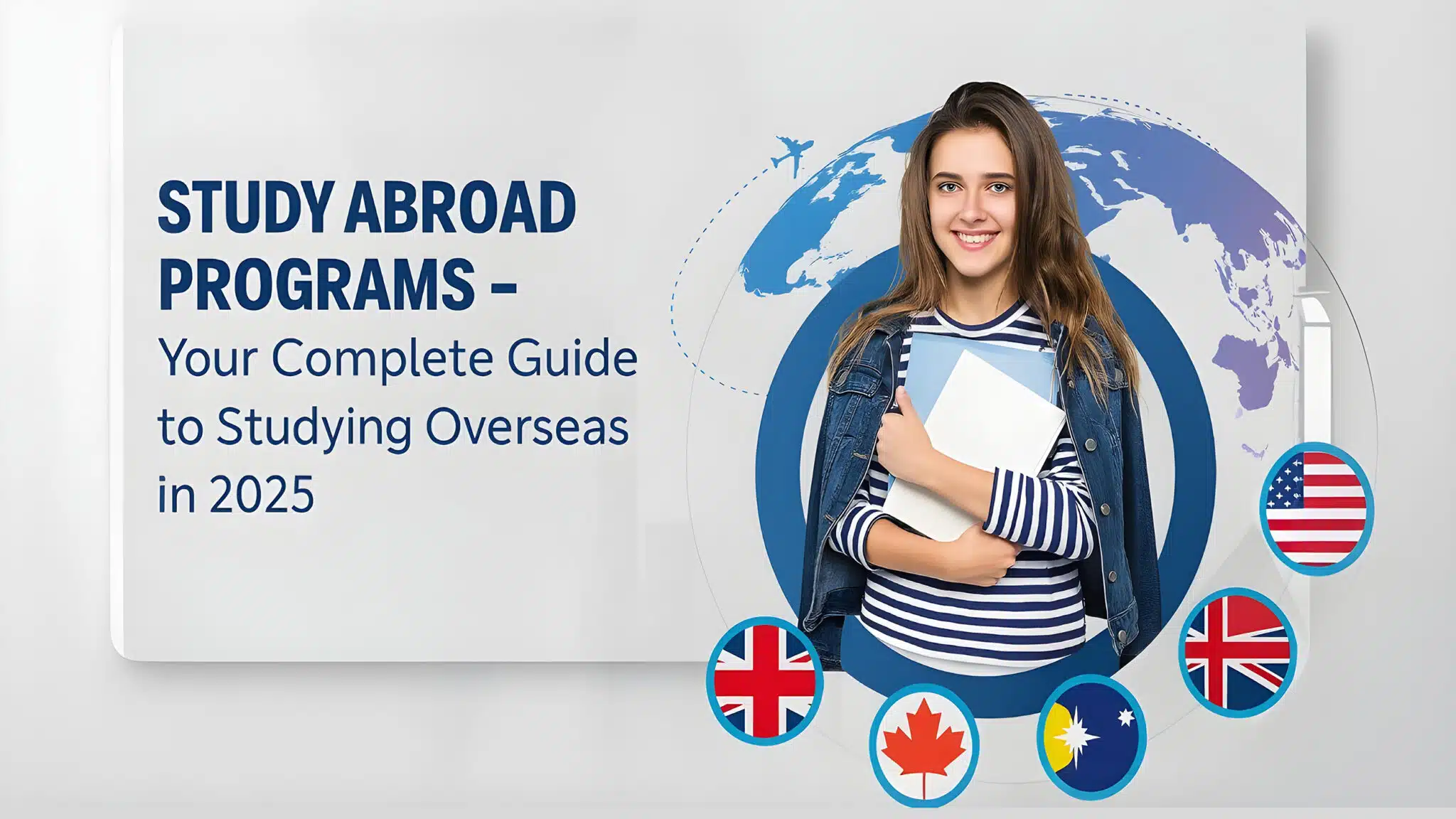The idea of pursuing an education in a foreign country is exciting and life-changing. It not only opens the door to world-class learning but also allows students to experience new cultures, languages, and global career opportunities. Whether you are planning to study in Canada, Australia, the UK, or Germany, enrolling in study abroad programs can greatly enrich your academic and personal journey.
In this blog, we’ll cover everything you need to know about study abroad programs—including benefits, popular destinations, application processes, tuition fees, scholarships, and visa requirements. This guide is especially helpful for Bangladeshi students and other international applicants aiming to study overseas in 2025.
What Are Study Abroad Programs?
Study abroad programs allow students to complete part or all of their education in a foreign country. These programs can vary in length and purpose, from short exchange semesters to full-degree bachelor’s, master’s, or PhD courses.
Types of Study Abroad Programs:
-
Full Degree Programs (Bachelor’s, Master’s, PhD)
-
Semester Exchange Programs
-
Short-Term Summer or Winter Courses
-
High School (K-12) Study Abroad
-
Vocational and Certificate Courses
-
Internship and Research-Based Placements
Benefits of Study Abroad Programs
-
Internationally Recognized Degrees
-
Exposure to New Cultures and Languages
-
Access to Advanced Research Facilities
-
Improved Career Prospects
-
Personal Growth and Independence
-
Post-Study Work Visas and Permanent Residency (PR) Pathways
Best Countries for Study Abroad Programs in 2025
Here are some of the top destinations for international students:
| Country | Highlights |
|---|---|
| Canada | Affordable education, post-study work visa (PGWP), pathway to PR |
| Australia | Strong multicultural communities, 485 post-study visa |
| UK | One-year master’s programs, Graduate Route visa |
| USA | Largest number of top-ranked universities |
| Germany | Low to no tuition fees at public universities |
| New Zealand | Safe and student-friendly with work rights |
| Netherlands | English-taught programs, high employability rate |
Cost of Study Abroad Programs
Understanding the cost is crucial for proper planning. Here’s an estimate of average yearly expenses:
| Country | Tuition Fees (Yearly) | Living Expenses (Yearly) |
|---|---|---|
| Canada | CAD 15,000 – 30,000 | CAD 10,000 – 15,000 |
| Australia | AUD 20,000 – 40,000 | AUD 21,000 – 27,000 |
| UK | £10,000 – 25,000 | £10,000 – 15,000 |
| USA | USD 20,000 – 45,000 | USD 12,000 – 18,000 |
| Germany | Free – €3,000 | €8,000 – 11,000 |
| New Zealand | NZD 20,000 – 35,000 | NZD 12,000 – 18,000 |
Scholarships for Study Abroad Programs
Many students can offset costs by applying for scholarships. Popular options include:
-
Canada: Lester B. Pearson Scholarship, Vanier Canada Graduate Scholarships
-
Australia: Australia Awards, Destination Australia Scholarship
-
UK: Chevening Scholarships, Commonwealth Scholarships
-
USA: Fulbright Program, University-specific aid
-
Germany: DAAD Scholarships, Erasmus+
-
New Zealand: Manaaki New Zealand Scholarships, NZ Excellence Awards
Scholarship Tips:
-
Apply early
-
Prepare a strong Statement of Purpose (SOP)
-
Get Letters of Recommendation (LORs) from credible sources
How to Apply for Study Abroad Programs
Step 1: Select Country and Program
Research universities that match your academic and financial goals.
Step 2: Meet Admission Requirements
Prepare documents like:
-
Academic transcripts
-
English proficiency test (IELTS, TOEFL, PTE)
-
Statement of Purpose (SOP)
-
CV/Resume
-
Letters of Recommendation
Step 3: Apply to Universities
Submit online applications directly or via country-specific portals.
Step 4: Apply for Scholarships
Many scholarships have separate application processes and earlier deadlines.
Step 5: Receive Offer Letter
Secure a seat by paying the required tuition deposit.
Step 6: Apply for Student Visa
Prepare for country-specific visa applications with required documents:
-
Acceptance Letter
-
Proof of Funds
-
Valid Passport
-
Visa Fee Payment
-
Health Insurance
Step 7: Plan Travel and Accommodation
Book flights, confirm housing, and attend pre-departure sessions.
Can You Work While Studying Abroad?
Yes. Most countries allow international students to work part-time:
-
Canada: Up to 20 hours per week during semesters
-
Australia: Up to 48 hours per fortnight
-
UK: Up to 20 hours per week during term time
-
USA: On-campus work up to 20 hours per week
-
Germany: Up to 120 full days per year
-
New Zealand: Up to 20 hours per week
Post-Study Opportunities
After completing study abroad programs, students can often apply for post-study work visas:
-
Canada: PGWP up to 3 years
-
Australia: Temporary Graduate Visa (485)
-
UK: Graduate Route – up to 2 years
-
USA: Optional Practical Training (OPT)
-
Germany: 18-month job search visa
-
New Zealand: Post-study work visa up to 3 years
Quick Tips for Study Abroad Success
-
Start planning 12-18 months in advance
-
Regularly check university deadlines
-
Prepare well for English proficiency tests
-
Apply for multiple universities to increase acceptance chances
-
Seek help from education consultants like Scholars Zone for faster processing
Let Scholars Zone Help You Study Abroad
At Scholars Zone, we guide students from Bangladesh and beyond through every step of the study abroad journey—from selecting the right study abroad program to applying for scholarships and securing visas.
📌HEAD OFFICE: House – 27/A, Rd No. #03, Dhadmondi, Dhaka – 1205.
🌐 Website: www.scholarszone.com.bd
📞 Phone: +88 01714-076485
📧 Email: contact@scholarszone.com.bd







